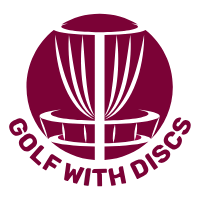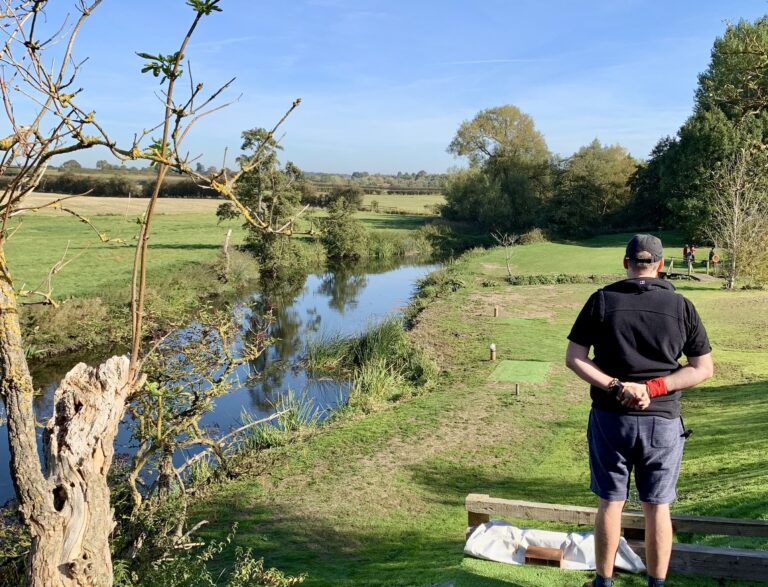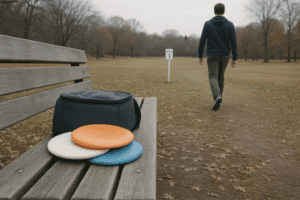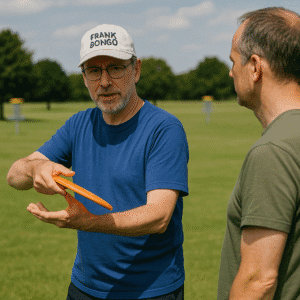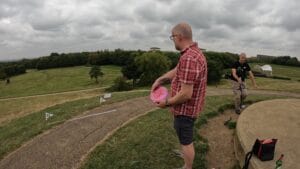Feeling fried, short on time, and longer on worries? Here is the case for the mental health benefits of disc golf. It is cheap, outdoors, and oddly effective. Instead of sitting still and thinking harder, you move, breathe, and let thoughts soften while trees do their quiet work.
We talk a lot about the mental side of disc golf, focus, patience, sportsmanship. What gets overlooked is the course itself. Moss underfoot. Leaves muttering overhead. The pleasing thud of feet on a dirt path. That is not scenery. That is therapy with chains.
Mental Health Benefits of Disc Golf Backed by Research
Psychologists describe restorative environments as places that help with mental fatigue recovery. Forest tracks, parkland, riverside paths. Most disc golf courses fit the profile. Attention Restoration Theory suggests that soft fascination in nature lets the mind rest from effortful focus. That is why a fairway can feel like a full reset.
Research linked with the American Psychological Association notes lower cortisol, steadier heart rates, and mood improvement after time in green spaces. Translation, disc golf stress relief is not a lucky fluke. It is biology. Add gentle walking, throw by throw decision-making, and a target to aim at, and you have green exercise with built-in feedback.
Call it restorative environments disc golf at its best. Every fairway can be walking meditation. Every throw is a chance to recentre. Every missed putt is low-stakes practice at acceptance.
- Benefits of disc golf include lower stress and sharper focus.
- Mental health benefits include calmer mood and better sleep.
- Disc golf benefits for mental health often arrive within a single round.

Disc Golf Therapy That Actually Works
Disc golf therapy works because it never feels like therapy. It is movement, play, and fresh air. You walk, you aim, you occasionally apologise to an oak. Meanwhile, your brain processes a cocktail of nature cues and simple goals without the neon glare of a treadmill screen.
Compared with indoor workouts, nature-based activities deliver bigger mood gains. A 2010 study in Environmental Science & Technology found outdoor exercise linked to more positive affect and a self-esteem boost than the same effort indoors. That is the power of green spaces and gentle challenge in the same hour.
Put simply, you could pay for a gym and stare at a wall. Or you could play disc golf and stare at a deer. One of those will feel like progress.
My Mental Reset at Quarry Park
A few months back, I spent a weekend at Quarry Park Disc Golf Course with a group of old mates. The plan was simple, throw some discs, catch up, eat badly. Work had been relentless. Deadlines leaked into weekends, Slack became my sleep soundtrack, and I was as relaxed as a pigeon at a fireworks display.
At first I could not switch off. Signal checks between holes, phantom inbox guilt, the lot. Around hole eight something shifted. No one needed anything. No meetings. No decisions. Only the Avon breeze, a fairway threading the trees, and friends quietly pretending we were not keeping score.
By the end I felt human again. No grand epiphany. Just that rare calm you cannot schedule. Quarry Park did not fix life. It gave me space to notice I did not need fixing, not that day.
How to Play Disc Golf for Mental Health
Want disc golf stress relief on demand? Try a few simple disc golf mindfulness techniques. No incense. No jargon. Just repeatable habits.
- Pause before each shot and really listen. Wind in trees beats any notification.
- Use box breathing, in for 4, hold for 4, out for 4. Repeat after tree hits.
- Leave your phone in your bag unless you are scoring. Silence is part of the round.
- Notice details, bark texture, cloud shapes, light on the basket. Let thoughts pass.
- Missed the mando? Smile. Throw again. It is practice for patience.
Disc golf and focus made simple
One-shot focus beats all-or-nothing thinking. Speak a cue before you throw, smooth reach-back, relaxed wrist, full follow-through. That tiny script settles nerves and builds a disc golf mental reset you can use anywhere.
Why Mental Health Benefits of Disc Golf Go Beyond Scorecards
Life can feel like endless scrolling. Disc golf cuts the feed. It is movement without pressure, quiet without awkward pauses, and social time without small talk. It is outdoor therapy wrapped in a game.
Green exercise supports anxiety reduction, and the course encourages fair play and sportsmanship that lifts self-respect. Call it forest therapy if you like. The effect is simple, less rumination, steadier mood, and a better chance of falling asleep before your head starts planning tomorrow.
In a time when care is expensive and waiting lists are long, a disc golf course offers a low-cost way to feel better. Disc golf for anxiety will not replace a clinician, yet it gives you momentum, something to build on today.

Final Thoughts
Feeling stressed or mentally scrambled? Grab a disc. Keep it simple. Walk, breathe, throw, repeat. This is mindful disc golf play without the lecture.
Therapy sessions end in 50 minutes. Disc golf does not. Take the win and go again next week.
Disc Golf Mental Health FAQs
Yes. Movement in green spaces lifts mood and calms busy thoughts. Many players notice benefits within a single round.
Definitely. Gentle walking plus aim-and-throw focus lowers arousal and eases tension more than indoor exercise.
Nature offers soft fascination, so the mind rests. Tree-filled courses are ideal for mental fatigue recovery.
No. The gains come from being outside, moving, and focusing. Score does not matter for mood improvement.
Start with one round a week. Even 30–45 minutes can provide disc golf stress relief.
Expect calmer mood, better focus, and light exercise. It pairs well with other care if you need it.
